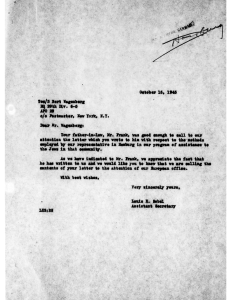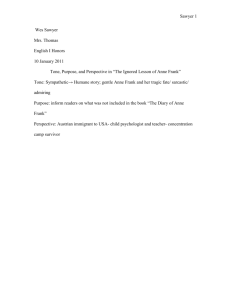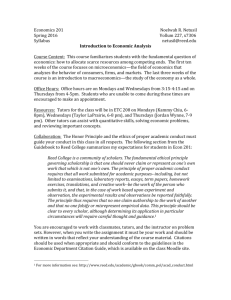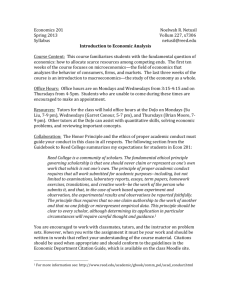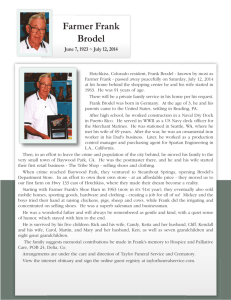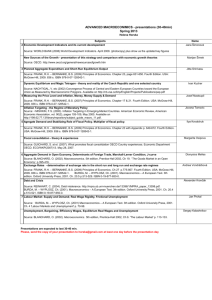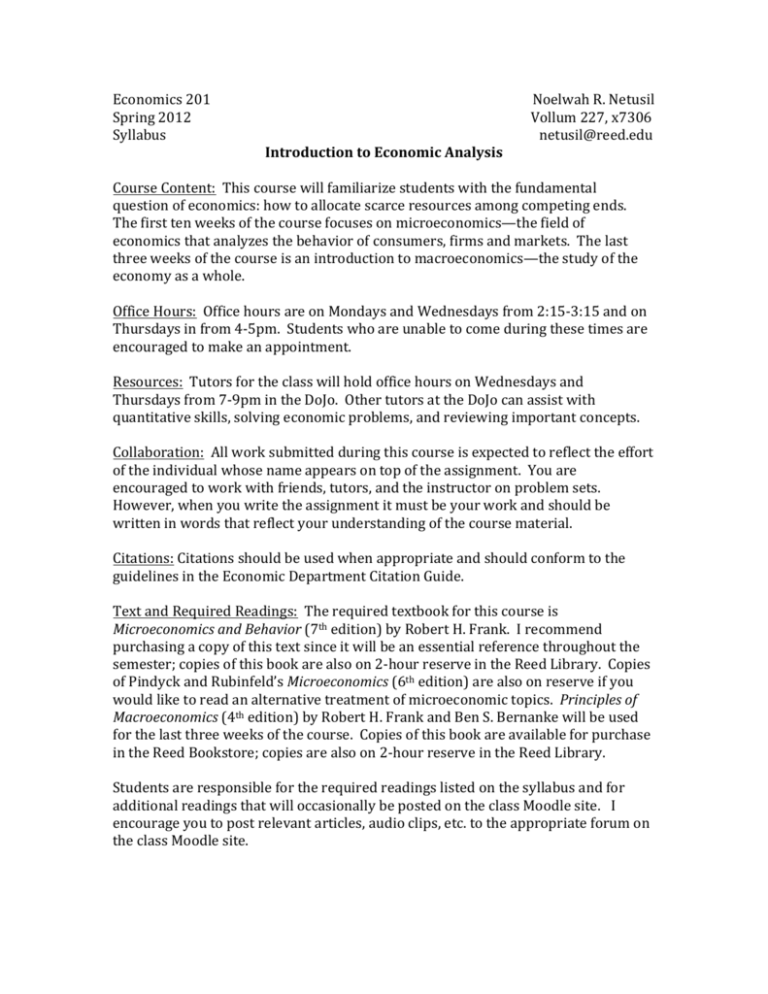
Economics 201 Spring 2012 Syllabus Noelwah R. Netusil Vollum 227, x7306 netusil@reed.edu Introduction to Economic Analysis Course Content: This course will familiarize students with the fundamental question of economics: how to allocate scarce resources among competing ends. The first ten weeks of the course focuses on microeconomics—the field of economics that analyzes the behavior of consumers, firms and markets. The last three weeks of the course is an introduction to macroeconomics—the study of the economy as a whole. Office Hours: Office hours are on Mondays and Wednesdays from 2:15-­‐3:15 and on Thursdays in from 4-­‐5pm. Students who are unable to come during these times are encouraged to make an appointment. Resources: Tutors for the class will hold office hours on Wednesdays and Thursdays from 7-­‐9pm in the DoJo. Other tutors at the DoJo can assist with quantitative skills, solving economic problems, and reviewing important concepts. Collaboration: All work submitted during this course is expected to reflect the effort of the individual whose name appears on top of the assignment. You are encouraged to work with friends, tutors, and the instructor on problem sets. However, when you write the assignment it must be your work and should be written in words that reflect your understanding of the course material. Citations: Citations should be used when appropriate and should conform to the guidelines in the Economic Department Citation Guide. Text and Required Readings: The required textbook for this course is Microeconomics and Behavior (7th edition) by Robert H. Frank. I recommend purchasing a copy of this text since it will be an essential reference throughout the semester; copies of this book are also on 2-­‐hour reserve in the Reed Library. Copies of Pindyck and Rubinfeld’s Microeconomics (6th edition) are also on reserve if you would like to read an alternative treatment of microeconomic topics. Principles of Macroeconomics (4th edition) by Robert H. Frank and Ben S. Bernanke will be used for the last three weeks of the course. Copies of this book are available for purchase in the Reed Bookstore; copies are also on 2-­‐hour reserve in the Reed Library. Students are responsible for the required readings listed on the syllabus and for additional readings that will occasionally be posted on the class Moodle site. I encourage you to post relevant articles, audio clips, etc. to the appropriate forum on the class Moodle site. Reserve Materials: The following books are on two-­‐hour reserve in the Reed Library. Feenstra, Robert C. and Alan M. Taylor. 2008. International Trade New York, NY: Worth Publishers. Frank, Robert H. 2008. Microeconomics and Behavior (7th edition) Boston, MA: McGraw-­‐Hill Irwin. Frank, Robert H. and Ben S. Bernanke. 2009. Principles of Macroeconomics (4th edition) Boston, MA: McGraw-­‐Hill Irwin. Pindyck, Robert S. and Daniel L. Rubinfeld. 2005. Microeconomics (6th edition) Upper Saddle River, NJ: Pearson Prentice Hall. Important Dates: Midterm Examinations: February 24 and April 6 Comprehensive Final Exam: during finals week (date to be announced by the Registrar’s Office at mid-­‐semester) There are five required problem sets for the course. Problem sets are due one week after they are distributed. Hard copies of all assignments are due at the start of class with late assignments penalized 1 letter grade for each day past the due date; assignments handed in more than 3 days after the due date will not be accepted. Please contact me as soon as possible if there are extenuating circumstances (illness, personal emergency) that justify an extension of a problem set deadline. Problem Set Date Distributed Date Due 1 Friday, February 3 Friday, February 10 2 Friday, February 10 Friday, February 17 3 Friday, March 2 Friday, March 9 4 Friday, March 23 Friday, March 30 5 Wednesday, April 18 Wednesday, April 25 2
Course Outline and Readings1 I.
Introduction to Microeconomics: January 23 Frank, Chapter 1 *Whaples, Robert. 2006. Do Economists Agree on Anything? Yes! The Economists’ Voice 3(9) Article 1. *Backhouse, Roger E. and Steven G. Medema. 2009. On the Definition of Economics Journal of Economic Perspectives 23 (1) 221-­‐233. Class Cancelled on January 25th II.
Demand, Supply and Market Equilibrium: January 27, 30 & February 1 Frank, Chapter 2 Surowiecki, James. 2002. Fare Games The New Yorker (March 18). The Economist. 2004. Guessing Games (November 20). Joyce, Christopher. 2009. Scientists Help Ranchers Wrangle Carbon Emissions National Public Radio (December 10). III.
Consumer Behavior and Demand: February 3, 6, 8 & 10 Frank, Chapters 3, 4 & 5 Glaeser, Edward L. 2005. Should the Government Rebuild New Orleans, Or Just Give Residents Checks? The Economists’ Voice 2 (4) Article 4. English, Ed. 2011. Tax and Nicotine. EconSouth (Second Quarter): 22-­‐26. *Waldfogel, Joel. 1993. The Deadweight Loss of Christmas The American Economic Review 83 (5) 1328-­‐1336. IV.
Applications of Consumer Theory: February 13 & 15 Frank, Chapters 6 & 8 The Economist. 2009. New-­‐Year Irresolution (December 30) 55. The Economist. 2008. A Contractual Approach to Self-­‐Improvement (February 7) 82-­‐
83. *Akerlof, George A and Robert J. Shiller. 2009. Animal Spirits: How Human Psychology Drives the Economy, and Why it Matters for Global Capitalism. Princeton, NJ: Princeton University Press. Readings marked with a * are optional. These are available in the stacks of the Reed Library or through article databases. 1
3
V.
Labor and Capital Markets: February 17, 20 & 22 Frank, Chapters 14 and 15 Barrow, Lisa and Cecilia Elena Rouse. 2005. Does College Still Pay? The Economists’ Voice 2(4) Article 3. Blau, Francine D. and Lawrence M. Kahn. 2007. The Gender Pay Gap The Economists’ Voice 4 (4) Article 5. Midterm Examination #1: Friday, February 24th VI.
Production and Cost: February 27, 29 & March 2 Frank, Chapters 9 and 10 Rich, Motoko. 2010. Math of Publishing Meets the E-­‐Book The New York Times (March 28) VII. Perfect Competition: March 5 Frank, Chapter 11 The Economist. 2009. Newspapers and Technology: Network Effects (December 17) VIII. Imperfect Competition: March 7, 9, 19 & 21 Frank, Chapters 12 and 13 The Economist. 2009. Economics Focus: E Pluribus Tunum (October 24) 88. * Schmalensee, Richard. 1978. Entry Deterrence in the Ready-­‐to-­‐Eat Breakfast Cereal Industry The Bell Journal of Economics 9(2) 305-­‐327. IX.
General Equilibrium and Efficiency: March 23 & 26 Frank, Chapter 18W X.
Market Failures: March 28, 30 & April 2 Frank, Chapters 16 and 17 Tomsho, Robert. 2010. Scraping Bottom, Some in Maine Look to Seaweed for Salvation The Wall Street Journal (January 4). Henrich, Joseph, Robert Boyd, Samuel Bowles, Colin Camerer, Ernst Fehr, Herbert Gintis, and Richard McElreath. 2001. In Search of Homo Economicus: Behavioral Experiments in 15 Small-­‐Scale Societies American Economic Review 91 (2) 73-­‐78. *Abrams, Burton A. and George R. Parsons. 2009. Is CARS a Clunker? The Economists’ Voice 6 (8) Article 4. *Burtraw, Dallas, Richard Sweeney and Margaret Walls. 2008. Crafting a Fair and Equitable Climate Policy: A Closer Look at the Options Resources (Fall) 20-­‐23. 4
*Davis, Lucas W. 2008. The Effect of Driving Restrictions on Air Quality in Mexico City Journal of Political Economy 116 (1) 38-­‐81. *Leape, Jonathan. 2006. The London Congestion Charge Journal of Economic Perspectives 20(4) 157-­‐176. XI.
International Trade: April 4 Feenstra and Taylor, International Trade, Chapter 1 Frank and Bernanke, Chapter 2 *Farrell, Diane. 2006. U.S. Offshoring: Small Steps to Make it a Win-­‐Win The Economists’ Voice 3(3). Midterm Examination #2: Friday, April 6th XII. Introduction to Macroeconomics: April 9 Frank and Bernanke, Chapters 4 and 5 Stiglitz, Joseph E. 2009. GDP Fetishism The Economists’ Voice 6 (8) Article 5. Revkin, Andrew C. 2005. A New Measure of Well-­‐Being From a Happy Little Kingdom The New York Times (October 4). XIII. Unemployment: April 11 Frank and Bernanke, Chapter 6 Martinez-­‐Garcia, Enrique and Janet Koech. 2010. A Historical Look at the Labor Market During Recessions Economic Letter-­‐-­‐Insights from the Federal Reserve Bank of Dallas 5(1). DeParle, Jason. 2012. Harder for Americans to Rise From Lower Rungs. The New York Times (January 4). Economic Mobility Project: An Initiative of the Pew Charitable Trusts. Poll 2011: Economic Mobility and the American Dream—Where Do We Stand in the Wake of the Great Recession? XIV. Economic Growth: April 13 Frank and Bernanke, Chapter 7 The Economist. 2010. Worth a Hill of Soyabeans (January 7) Cox, Michael W. and Richard Alm. 2008. China and India: Two Paths to Economic Power Federal Reserve Bank of Dallas Economic Letter 3(8). XVI. The Financial System: April 16 Frank and Bernanke, Chapters 8 and 9 Haskins, Ron. 2012. Addressing the Budget Deficit: The Next President Must Solve the U.S. Deficit Crisis The Brookings Institution Campaign 2012 Papers No. 1 (January 19) 5
Sawhill, Isabel V. 2012. A Perspective on the Budget Deficit and Job Creation The Brookings Institution (January 19). Gale, William G. A Perspective on the Budget Deficit and Revenues The Brookings Institution (January 19). *Bernanke, Ben S. 2007. Microfinance in the United States. Speech delivered at the ACCION Texas Summit on Microfinance in the United States, San Antonio, Texas (November 6). XV.
The Short Run-­‐-­‐Economic Fluctuations: April 18 Frank and Bernanke, Chapter 10 Romer, Christina D. 2011. Jobless Rate Is Not the New Normal The New York Times (April 9). XVI. The Short Run-­‐-­‐Spending and Output: April 20 Frank, and Bernanke, Chapter 11 The Economist. 2009. Much Ado About Multipliers. (September 26). XVII. The Federal Reserve: April 23 Frank and Bernanke, Chapter 12 XVIII. Aggregate Demand and Aggregate Supply: April 25 Frank and Bernanke, Chapter 13 Aizenman, Joshua and Gurnain Kaur Pasricha. 2011. The Net Fiscal Expenditure Stimulus in the US, 2008-­‐2009: Less Than What You Might Think, and Less than the Fiscal Stimuli of Most OECD Countries. The Economists’ Voice 8(2) Article 5. XIX. Macroeconomic Policy: April 27 Frank and Bernanke, Chapter 14 Mankiw, N. Gregory, Christina D. Romer, Tyler Cowen, Robert H. Frank, Robert J. Shiller, and Richard H. Thaler. 2011. I Just Got Here, but I Know Trouble When I See It The New York Times (December 31). Krugman, Paul. 2009. How Did Economists Get It So Wrong? The New York Times (September 2). *Krugman, Paul. 1998. Baby-­‐Sitting the Economy Slate (August 14). 6

